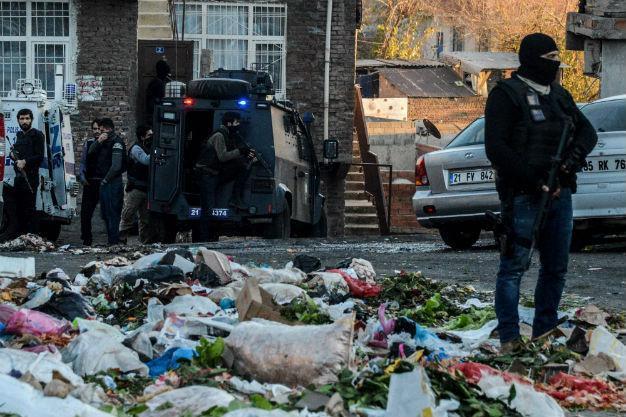Turkish PM accuses southeastern municipalities of supporting terror, vows punishment
ANKARA

AFP photo
Turkish Prime Minister Ahmet Davutoğlu has vowed retribution against municipalities in Southeast Anatolia for acting as “logistical centers” for the outlawed Kurdistan Workers’ Party (PKK) by using public resources to dig ditches and build barricades against security forces.“The matter with them is they do not build up and allow our cities to flourish. Their goal is to not have our region’s people live happily, in serenity and in prosperity,” Davutoğlu said Jan. 6.
“There is nothing but ideology, arguments, lies, black propaganda and terror: Instead of using financial resources, which are entrusted by the nation for the nation, they are spending it on dark culverts which are difficult to trace. The pickaxes, graders, trucks and construction equipment for the terrorists are supplied by them. The administrators of these municipalities, some of whom are working like logistical centers for the terrorist organization [PKK], will definitely pay the price for all of this treason and wrong practices,” he said, while delivering a speech at a launch ceremony for 2016 projects by Ankara Metropolitan Municipality.
Violence in a three-decade-old conflict between Turkish security forces and militants of the PKK flared in July after the collapse of peace talks. Locals in several southeastern areas subsequently erected barricades in an effort to prevent the entry of security forces, whom they accuse of committing rights abuses. President Recep Tayyip Erdoğan said last week there would be no let-up in a military campaign he said had killed more than 3,000 militants in 2015.
As military operations continue in urban centers across the predominantly Kurdish-populated southeastern Anatolia region, a local court this week sentenced the former mayor of the eastern Anatolian province of Van, Bekir Kaya, to 15 years in jail, the maximum term for the crime of membership in the PKK. Kaya, who was re-elected to a second term in 2014 from the Democratic Regions Party (DBP), the sister party of the Peoples’ Democratic Party (HDP), had spent part of his first mayoral tenure in pre-trial detention on the charges, which were brought in 2012.
As of early January, 10 mayors from the DBP have been suspended and detained, while 106 municipalities under the DBP have been subject to investigations on charges related to favoring autonomy, maintaining a co-chair structure and terrorism.
Eight mayors have been separately suspended, while one mayor was released on probation and another has remained under house arrest.
Mayors have been detained on charges of “disrupting the unity and territorial integrity of the state,” “membership in a terrorist organization and making terrorist propaganda,” “acting as a human shield” and “providing logistical support to a terrorist organization.”
The investment expenditures of Mardin Metropolitan Municipality constitute only 7 percent of its total expenditures, Davutoğlu said, referring to the municipality which is held by the Peace and Democracy Party (BDP), one of the HDP’s forerunners.
“In other cities, this figure is 46 percent,” he said. “Citizens are waiting for service and these gentlemen are digging holes and building up barricades instead of doing this. Then they are coming up with some claims that they would offer more services if more opportunities had been given to local administrations,” Davutoğlu said.
















